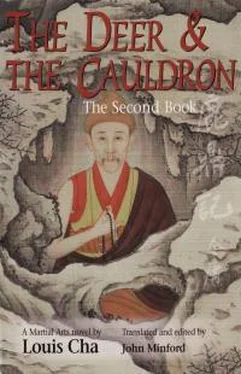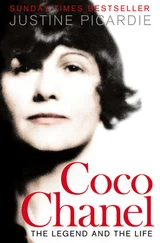HUANG ZONGXI (1610’1695) Renowned Loyalist figure who fought alongside the Ming resistance, retiring in 1649 to a life of scholarship. His work Mingyi daifang lu (sometimes translated as The Way of the Prince), written in 1662, a book which Kang Xi praises to Trinket in Chapter 28, was an outstanding Confucian attempt to curb the authoritarian nature of Imperial rule, and introduce much’needed reforms into the Chinese political system. (See de Bary, The Sources of Chinese Tradition [New York, 1960], pp. 530’542, for extracts in translation.)
IRON HAND, Lady Lady Yellow Tunic, the woman warrior. Called Iron Hand because of the hook at the end of her right arm. Previously guru of the Five Poisons Sect, she then became a disciple of Yuan Chengzhi, and joined the Mount Hua School. She gives Trinket the poisoned darts, which prove to be invaluable in his later adventures.
XXII
IVAN Half’witted brother of Princess Sophia, made joint Tsar with Peter, under Princess Sophia’s Regency.
JERKEN Manchu official, Chief Secretary of the Board of Rites, sent as an envoy to Satrap Wu.
RANG, Prince (1645’1697) Giyesu, great’grandson of Nurhachi; friend of Trinket’s.
KANG XI, the boy Emperor (1654’1722) This was the reign title of the second Manchu Emperor; his personal name was Xuanye (which means roughly speaking Dark or Mysterious Effulgence-he calls himself Misty, for Trinket’s benefit). He was the third son of the Emperor Shun Zhi, whom he succeeded at the age of eight. By the beginning of the Second Book he is rid of the overweening Regent Oboi, and has assumed the reins of power. The Third Book chronicles his true coming of age as a ruler, his victory over the Three Feudatories, and his attempt to win over the goodwill of the Chinese intelligentsia. Anyone interested in this extraordinary and civilized contemporary of Louis XIV is advised to read Jonathan Spence’s brilliant study, based on original documents, Emperor of China’ Self’portrait ofK’ang’hsi (London, 1974).
KONG SHANGREN (1648’1718) Descendant of Confucius, and author of the famous play The Peach Blossom Fan, set in the last days of the Ming dynasty (from which Beggar Wu sings an aria in Chapter 21).
KONG YOUDE (died 1652) A former general serving the Manchu cause. His daughter, Kong Sizhen (born c.1641), was held in great favour at court, and had even been granted the status of a minor princess on account of her father’s services. She had married Sun Yarding.
KUANG TIANXIONG, Brother Triad from Red Fire Lodge of Guizhou Province.
KUNMING Capital of Yunnan Province, the Satrap’s fief in southwestern China, where (as the Chinese say) it is spring four times a year.
GLOSSARY OF PEOPLE AND PLACES
XXIII
LAUREL (‘Laurie Goong’goong’) Junior eunuch in attendance on Old Hai, murdered and subsequently impersonated by Trinket. Kang Xi continues to refer to Trinket occasionally as Laurie. LERGIYEN, Prince Fourth son and heir of the Manchu Prince Lekedehun (died 1652). Manchu general in command of expeditionary force sent to combat the Satrap’s rebellion. LI, Brother Li Lishi, tall thin elderly Triad. LI XIHUA Young scholar and kungfu adept, son of Prince Li Yan. LI YAN Former counsellor to Bash’em Li during his rebellion; Bash’em had him unjustly put to death, and for this his son Li Xihua swears to take vengeance. LI ZICHENG see Bash’em LIN XINGZHU Formerly a general in the Resistance, under Coxinga (historically, according to Hummel, he was one of Wu Sangui’s generals, not Coxinga’s); trained in the Ditang School of kungfu; he transferred his loyalties to the Manchu cause and played an important part in the campaign leading up to the Treaty of Nerchinsk. LITTLE COUNTESS Mu Jianping, younger sister of Mu Jiansheng, descended from old Duke Mu. In the Third Book, she becomes one of Trinket’s seven wives. LITTLE DOUBLE The alternative name suggested by Su Quan for Trinket’s daughter (by the Princess Ning), after the God of Gambling has twice insisted on the somewhat less feminine name Bench. LIU DAHONG Shifu of the Mu Family, known on River and Lake as the Iron Dragon. LIU GUOXUAN General in Coxinga’s regime in Taiwan, who finally surrendered to the Manchus. XXIV
LIU YIZHOU Member of the Mu Family, of pale complexion and questionable courage; in love with Fang Yi.
LIUZHOU Large prefectural city in central Guangxi Province. Famous for its coffin boards.
LONG WHITE MOUNTAINS Mountain range between Manchuria and Korea; place of origin of the Aisin Gioro clan, to which the Imperial Manchu family belonged.
LOSHA An old Chinese name for Russia, which sounds a bit like Russia, but in Chinese means Demon. The Chinese have historically been rather fond of referring to barbarians and foreigners as one sort of devil or another (hence Foreign Devil).
LU, Doctor Lu Gaoxuan, senior member of the Mystic Dragon Sect; a man of wide reading and culture, and a connoisseur of calligraphy and painting.
LU LIULIANG (1629’1683) Loyalist scholar, one of the Four
Gentlemen of the Resistance.
MA BAO, Brigadier One of the Satrap’s top officers.
MA CHAOXING Fat Triad Lodge Master of the Clan Lodge of Guangxi Province.
MA YOU Provincial Governor of Jiangsu Province.
MACAO From the sixteenth century to the late twentieth century, a tiny Portuguese enclave in southern Guangdong Province.
MALJI Manchu Viceroy of the Three Provinces of Jiangsu, Anhui, and Jiangxi.
MALLET Trinket’s second son, by Su Quan (ex’Madame Hong). MAO DONGZHU see Empress Dowager (Fake’) MEATBALL Thin Dhuta’s principal nickname.
QLOSSARY OF PEOPLE AND PLACES MINGJU (1635’1708) Manchu Minister of the Board of War; Kang Xi’s trusted advisor during the war against the Three Feudatories. His son, Nalan Xingde, became one of the great lyric poets of the Manchu dynasty (writing in Chinese). MOLO (died 1675) Manchu general in command of the western front against Satrap Wu. MU FAMILY This was the common appellation for the powerful faction surrounding the descendants of Old Duke Mu (1342’1392), who had made the south’western province of Yunnan their personal fief throughout the Ming dynasty. Young Duke Mu (died 1661) was a loyal supporter of the Ming Pretender, Prince Gui. The Mu Family were implacably opposed to Satrap Wu, who after the arrival of the Manchus supplanted them in the south’west. The Family had its own distinctive style of kungfu. MU JIANSHENG see Young Count MU JIANPING see Little Countess MU TIANYAN Provincial Treasurer of Jiangsu Province. MUKDEN Capital of present’day Liaoning Province (the city is now known as Shenyang), the Manchu capital before the conquest of China. MYSTIC DRAGON This fanatical Sect, with its powerful mantra’based kungfu, is based on Snake Island. Details of the Sect emerge in the Second Book. It is divided into Five Branches, each having its own colour, and its own Dragon Marshal. Among other things, there has been a purge of the Sect’s ‘elders’, in favour of the young, and more fanatical, ‘acolytes’. It is explained that one of the ways in which the Leader, Hong Antong, maintains control over the members of his Sect is by giving them the powerful Leopard Embryo Pill, which then makes them dependent on the Leader (or Madame Hong) for regular doses of the Antidote. NAN HUAIREN see Verbiest XXVI
NATALIA Dowager Tsarina of Russia. See Sophia, Princess. NERCHINSK Russian settlement founded in the 1650s.
NING, Princess Emperor Kang Xi’s fifteen’ or sixteen’year’old tomboyish ‘half’sister’. In actuality, nothing of the kind, but the daughter of Mao Dongzhu (the Fake’Empress Dowager) and a Han’Chinese father, Deng Bingchun. In the Third Book, she becomes one of Trinket’s seven wives.
NURHACHI (1559’1626) The Grand Progenitor, founder of the Manchu (Qing) dynasty.
Читать дальше












